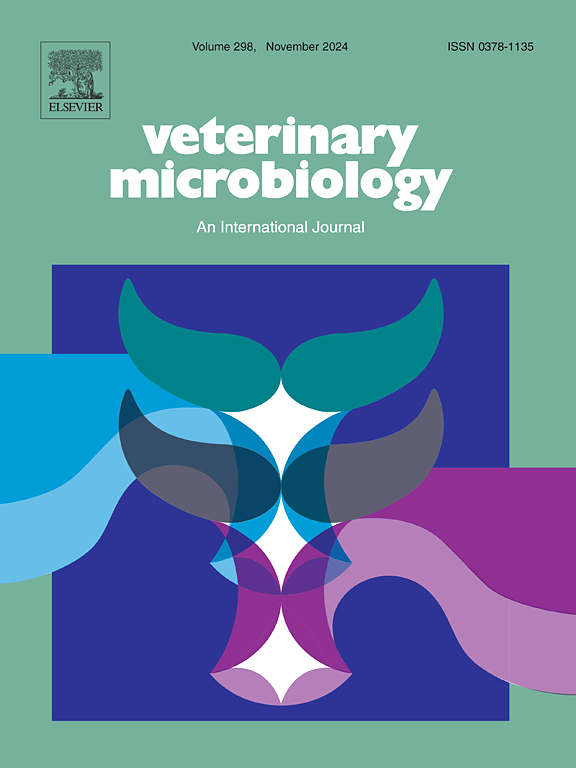Honokiol rescues progranulin deficiency in pathogen-induced and genetically driven neurodegeneration: Bridging veterinary models with therapeutic development
IF 2.4
2区 农林科学
Q3 MICROBIOLOGY
引用次数: 0
Abstract
Progranulin (PGRN), a crucial regulator of lysosomal function, is deficient in several neurodegenerative disorders. Restoring PGRN levels with small molecules presents a promising therapeutic strategy for these conditions. Honokiol (HNK), a polyphenolic compound known for its neuroprotective effects, has demonstrated potential in various neurodegenerative diseases (ND), though its precise mechanisms remain unclear. This study explores HNK’s ability to upregulate PGRN expression in nerve cells and central nervous system tissues. Our results show that HNK enhances PGRN expression and lysosomal targeting in nerve cells, rescues PGRN deficiency in PHEV-infected models both in vitro and in vivo, and significantly increases brain PGRN levels in GRN haploinsufficient mice following oral administration. Collectively, these findings establish HNK's multimodal action as a promising therapeutic intervention for neurodegenerative conditions spanning both infectious (PHEV-mediated) and genetic (GRN-linked) etiologies of PGRN deficiency.
在病原体诱导和遗传驱动的神经退行性变中,本木酚可以拯救前颗粒蛋白缺乏:将兽医模型与治疗发展联系起来
前颗粒蛋白(PGRN)是溶酶体功能的关键调节因子,在几种神经退行性疾病中缺乏。用小分子恢复PGRN水平是一种很有前途的治疗策略。Honokiol (HNK)是一种以其神经保护作用而闻名的多酚化合物,已被证明在各种神经退行性疾病(ND)中具有潜力,尽管其确切机制尚不清楚。本研究探讨了HNK在神经细胞和中枢神经系统组织中上调PGRN表达的能力。我们的研究结果表明,HNK增强了PGRN在神经细胞中的表达和溶酶体靶向性,在体外和体内修复了phev感染模型的PGRN缺陷,并在口服GRN单倍体不足的小鼠中显著提高了脑PGRN水平。总的来说,这些发现确立了HNK的多模式作用,作为一种有希望的治疗干预神经退行性疾病,包括感染性(phev介导)和遗传性(grn相关)病因的PGRN缺乏。
本文章由计算机程序翻译,如有差异,请以英文原文为准。
求助全文
约1分钟内获得全文
求助全文
来源期刊

Veterinary microbiology
农林科学-兽医学
CiteScore
5.90
自引率
6.10%
发文量
221
审稿时长
52 days
期刊介绍:
Veterinary Microbiology is concerned with microbial (bacterial, fungal, viral) diseases of domesticated vertebrate animals (livestock, companion animals, fur-bearing animals, game, poultry, fish) that supply food, other useful products or companionship. In addition, Microbial diseases of wild animals living in captivity, or as members of the feral fauna will also be considered if the infections are of interest because of their interrelation with humans (zoonoses) and/or domestic animals. Studies of antimicrobial resistance are also included, provided that the results represent a substantial advance in knowledge. Authors are strongly encouraged to read - prior to submission - the Editorials (''Scope or cope'' and ''Scope or cope II'') published previously in the journal. The Editors reserve the right to suggest submission to another journal for those papers which they feel would be more appropriate for consideration by that journal.
Original research papers of high quality and novelty on aspects of control, host response, molecular biology, pathogenesis, prevention, and treatment of microbial diseases of animals are published. Papers dealing primarily with immunology, epidemiology, molecular biology and antiviral or microbial agents will only be considered if they demonstrate a clear impact on a disease. Papers focusing solely on diagnostic techniques (such as another PCR protocol or ELISA) will not be published - focus should be on a microorganism and not on a particular technique. Papers only reporting microbial sequences, transcriptomics data, or proteomics data will not be considered unless the results represent a substantial advance in knowledge.
Drug trial papers will be considered if they have general application or significance. Papers on the identification of microorganisms will also be considered, but detailed taxonomic studies do not fall within the scope of the journal. Case reports will not be published, unless they have general application or contain novel aspects. Papers of geographically limited interest, which repeat what had been established elsewhere will not be considered. The readership of the journal is global.
 求助内容:
求助内容: 应助结果提醒方式:
应助结果提醒方式:


